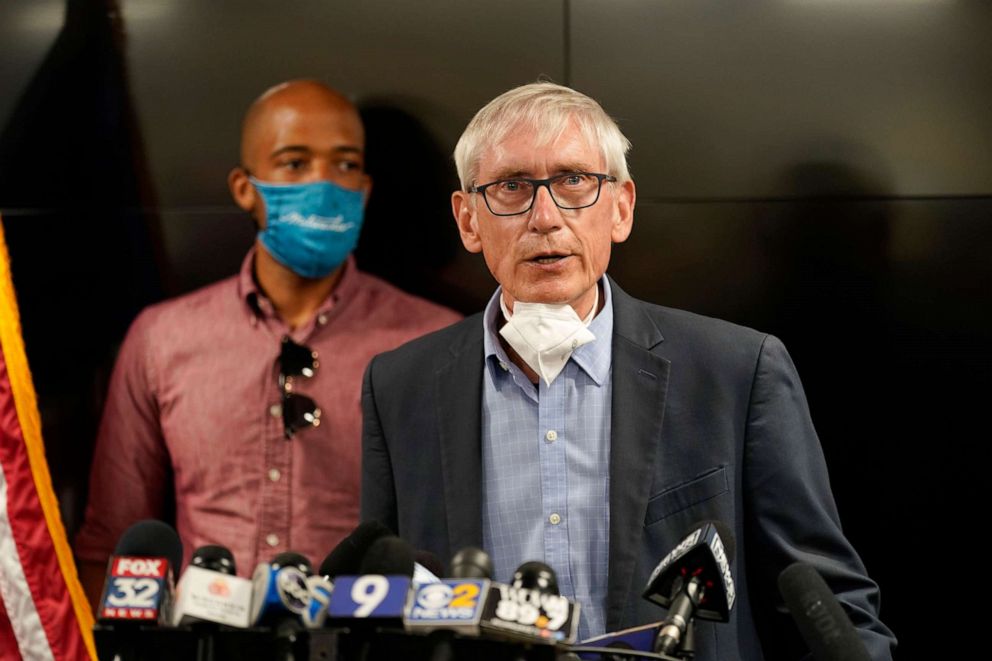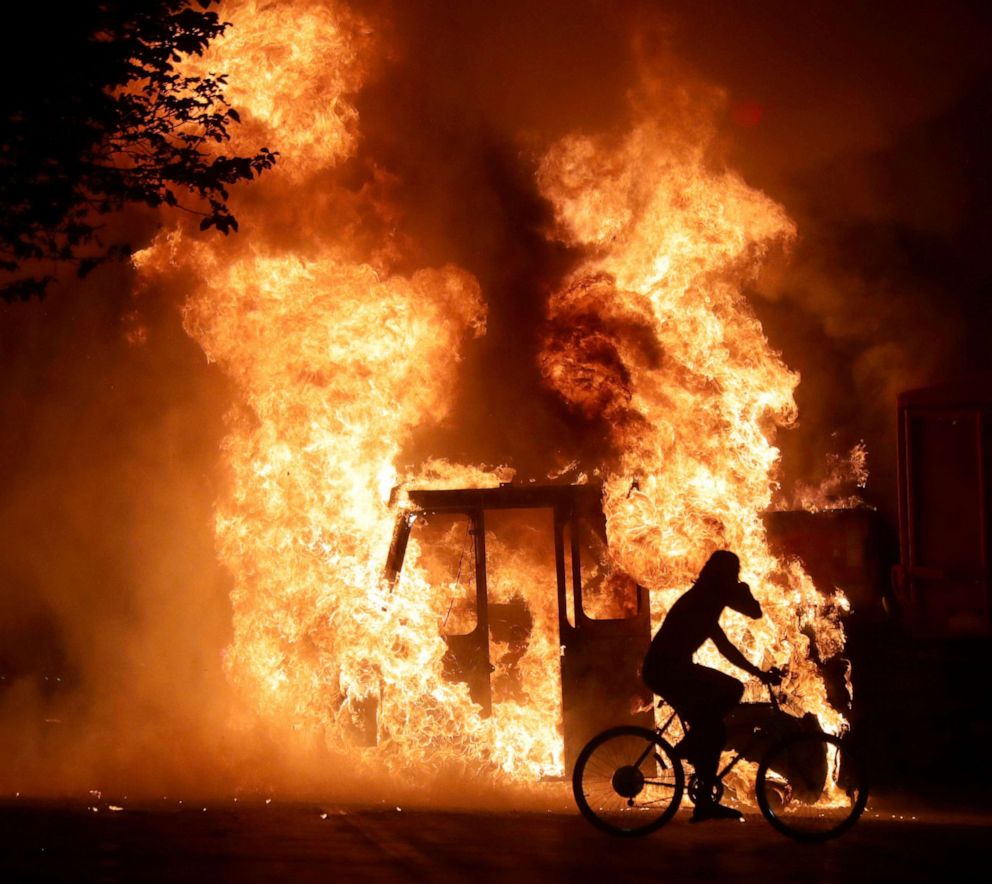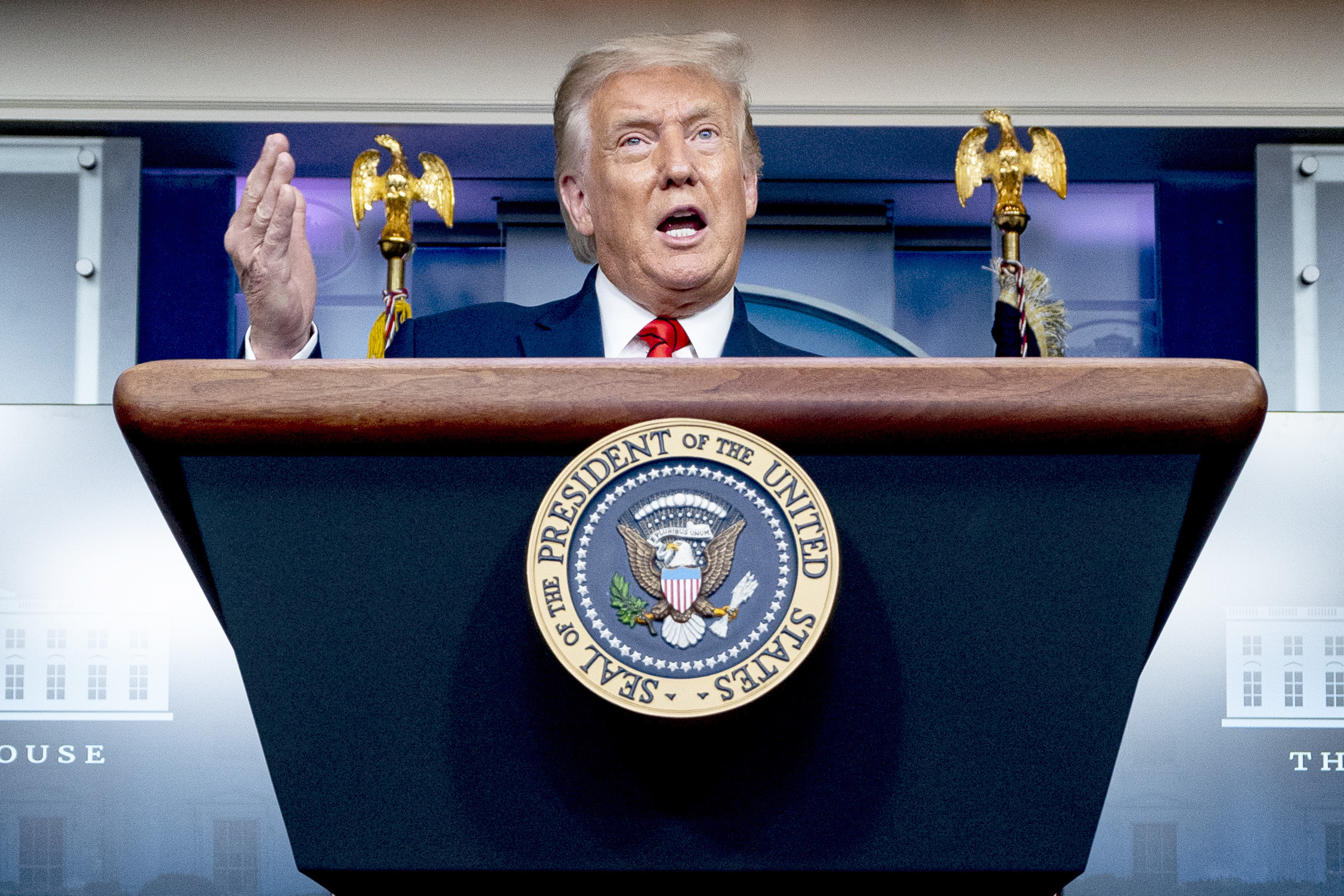White House claims Trump trip to Kenosha 'unifying,' says he will tour damaged businesses
His visit on Tuesday comes after more than a week of deadly protests in Kenosha.
President Donald Trump on Monday planned to move forward with a visit to Kenosha, Wisconsin, on Tuesday in what the White House said would be a "unifying" visit, even as the state's governor has asked the president to reconsider and his Democratic opponent Joe Biden has accused him of "fanning the flames of hate and division in our society."
The president's visit comes against the backdrop of heightened tensions and a week of protests after a white police officer shot a Black man, Jacob Blake, in the back seven times last weekend, leaving him partially paralyzed.
In an evening news conference Monday, Trump said "no" when asked if he is giving any consideration to Wisconsin Gov. Tony Evers and Mayor John Antaramian's requests not to visit to Kenosha.
"No, because that -- Kenosha is something we did a good job on," Trump said. "But I have to see the people that did such a good job for me and we are meeting with numerous people and we have tremendous support in the state of Wisconsin so I promise them when it all gets taken care of, we'll go."
Asked if his presence could increase violence or exacerbate tensions, Trump said it will instead increase enthusiasm.
"It will also increase enthusiasm and it could increase love and respect for our country, and that's why I am going because they did a fantastic job," Trump said.
Earlier Monday, White House press secretary Kayleigh McEnany said in an interview on "Fox and Friends" that Trump "loves the people of Wisconsin and he looks forward to speaking directly to them and unifying the state."
She mocked the idea of Biden delivering a speech in Pittsburgh on Monday to respond to the unrest in Wisconsin and elsewhere, saying that Trump by contrast "shows up" and is "demonstrating his respect for the American people by actually going to places where Americans are hurting."
But Evers, a Democrat, does not see the president's visit as helpful and wrote to the president Sunday to say, "I am concerned your presence will only hinder our healing."
In his letter, Evers expressed concern that a visit from the president would redirect resources from the city's recovery "at a time when it is critical that we continue to remain focused on keeping the people of Kenosha safe and supporting the community's response."

While the state's Democratic governor does not welcome the president's visit, seven conservative-leaning members of the 23-member Kenosha County Board, which represents the area around the city, wrote a separate letter encouraging Trump to visit.
"Please do not cancel your plans to visit Kenosha to meet with citizens and business owners devastated by the violence that took place this past week," the letter reads. "Kenoshans are hurting and looking for leadership, and your leadership in this time of crisis is greatly appreciated by those devastated by the violence in Kenosha."
McEnany said the current plan was for the president to meet with law enforcement and tour "some of the damage from the riots" while in Kenosha.
Protesters have marched daily for over a week since Blake's shooting, demanding racial justice and opposing police brutality. Some gatherings have led to damage to property, and on Tuesday, police said, an Illinois teenager opened fire during demonstrations and killed two protesters.

It remained an open question Monday whether the president may meet with Blake's family, but Trump said in his evening news conference that he still has not made contact with Blake's family, citing the presence of lawyers complicating matters.
"I thought it would be better not to do anything where there are lawyers involved. They wanted to have lawyers involved and I thought that was inappropriate so I didn't do that, but I did speak with the pastor -- was a fine man, wonderful man -- and I think we had a great talk, and I may at some point do that, but they did have a lawyer that wanted to be on the phone and I said no, that's inappropriate but I gave my best regards," Trump said.
The family's attorney Benjamin Crump told ABC News later that Trump's chief of staff reached out to the family and was trying to set up a call, but when the family requested the call go through Crump, the White House refused.
"When President Obama called Trayvon and Michael Brown's family, when Vice President Biden called George Floyd's family, their attorneys were present. We don't understand why it would be an issue with Trump's administration, and furthermore last time I checked they had a DOJ investigation that had been started in this matter, so it would be totally appropriate for family to have counsel on the phone," Crump said.
"They (White House) have their attorneys. Why shouldn't the family have their attorneys?" he continued.
White House Chief of Staff Mark Meadows told reporters Friday he had spoken to a pastor connected to the family but had not been able to talk with any of Blake's relatives.
Asked about the possibility of a meeting, McEnany on Monday said the White House is "efforting outreach" to the family but has "not been able to connect yet."
"Our family don't particularly want to have anything to do with him," Blake's uncle, Justin Blake, told ABC News in an interview Sunday. "We believe he incited this violence."
The president remained silent on Blake's shooting for days following the incident, only breaking his silence Friday in an interview with ABC affiliate WMUR, saying "It was not a good sight, I didn't like the sight of it certainly and most people would agree with that."
At his evening news conference Monday, the president would not offer a condemnation of Kyle Rittenhouse, who is accused of allegedly killing two people during protests in Kenosha. Instead, he concluded that Rittenhouse's actions amounted to self-defense.

"That was an interesting situation," Trump said when asked about Rittenhouse's case. "You saw the same tape as I saw and he was trying to get away from them I guess, it looks like, and he fell ... then they very violently attacked him and it was something that we are looking at right now and it's under investigation."
He also defended the use of paintballs used by some of his supporters on protesters, seeming to excuse the tactic by saying that "paint is not bullets."
"These people, they protested peacefully, they went in very peacefully, and I'll tell you what they are protesting. They're protesting when they turn on television or read whatever they might be reading and they see a city like Chicago where 78 people were shot and 13 died or a city like New York where the crime rate has gone through the roof," Trump said.
Earlier Monday, McEnany wouldn't say whether Trump condemned the alleged actions of the teenager.
"The president is not going to, again, weigh in on that," she said during a news conference at the White House.
Over the weekend, Trump "liked" a tweet that said Rittenhouse was "a good example of why I decided to vote for Trump."
In an exchange with ABC News, McEnany said Trump did so "to bring some attention to some of the details that aren't as well known in that case," including, she said, that Rittenhouse "was being attacked, and that one of the individuals who arrived on the scene did have a gun."
Rittenhouse's lawyers have portrayed the teenager as having been attacked. According to prosecutors, the third person that Rittenhouse shot -- Gaige Grosskreutz, who was injured but didn't die -- did appear to be holding a handgun in his hand when he was shot.
"There were some details that were not public or as public as they should be, so he was referring to that with the like," McEnany said.
Teasing his upcoming trip on Twitter, the president on Monday said "I will see you Tuesday!" and made a misleading claim in taking credit for sending in the National Guard paired with another outlandish claim that "there would be no Kenosha right now" otherwise.
But it was the Wisconsin's governor -- not the president -- who activated the National Guard. The president does not have the authority to simply dispatch the National Guard at his will, as he implies in the tweet and has previously claimed.
While the president could seek to invoke the Insurrection Act to dispatch active duty federal forces domestically under extraordinary circumstances, the president has not done so.
But at a campaign rally on Friday, Trump said "we're going to have to look at" possibly using the Insurrection Act going forward as he sought to frame his reelection campaign in terms of a mission to "save democracy from the mob."
The president threatened to invoke the act during nationwide, largely peaceful protests in June, but ultimately never did.
ABC News' Whitney Lloyd, Zohreen Shah, Janice McDonald and Stephanie Wash contributed to this report.




